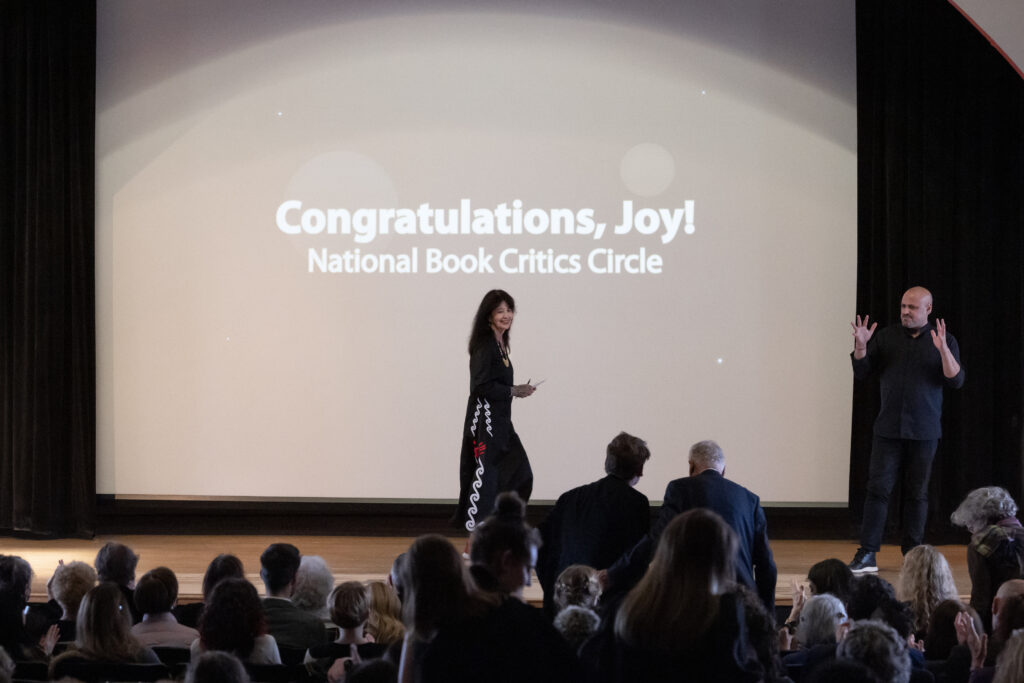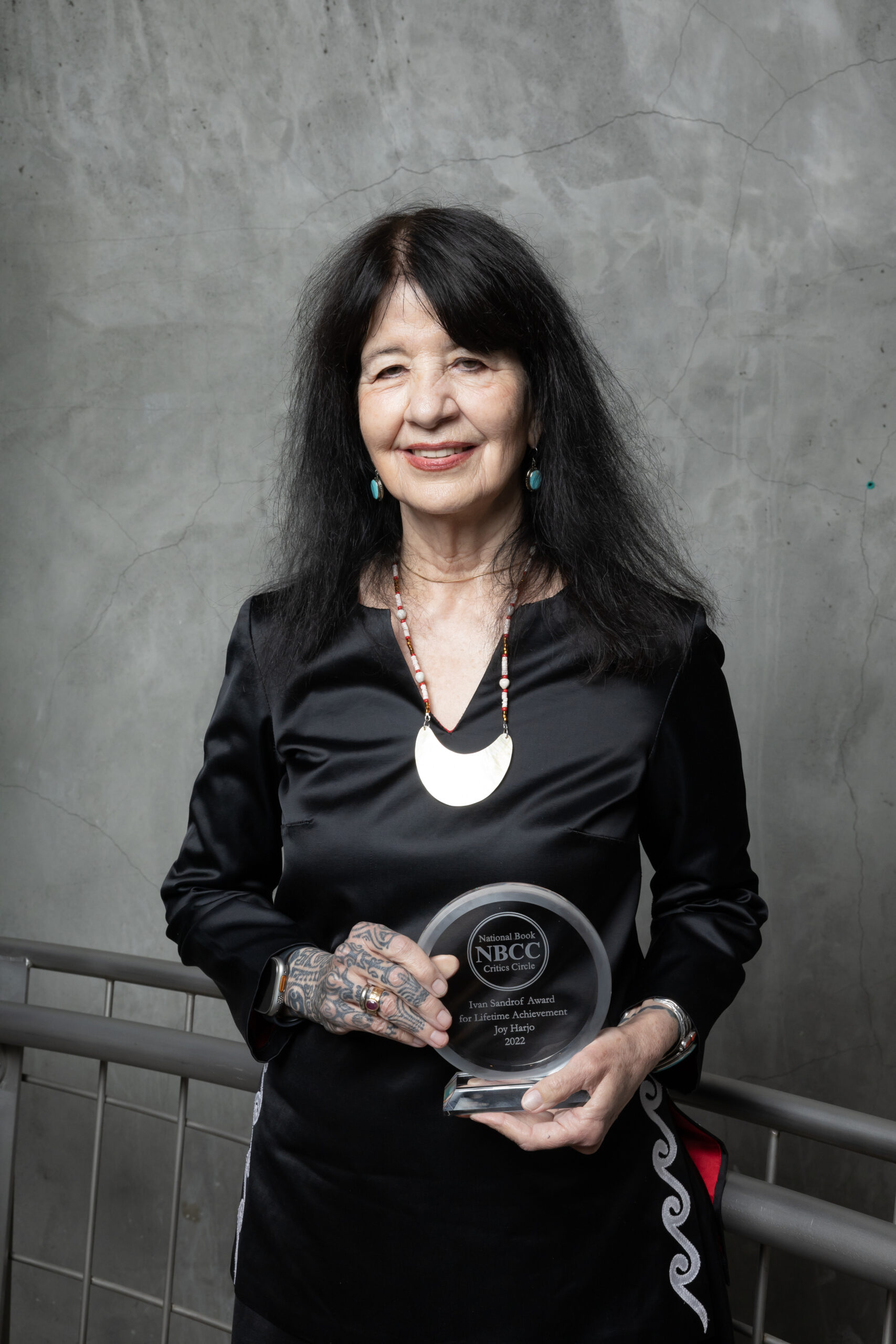Thank you, or mvto in our Mvskoke language. I am honored to be standing here before you, in person, to accept this honor for a lifetime of mischief, I mean writing. Of course, the best writing makes for a kind of mischief, that is, runs counter to the expected, opens doors of fresh insight that upset the status quo, makes a pathway for justice to have its say. I have always had the greatest respect for this organization, for those who read closely and pay attention to literary witnesses in the story field. The National Book Critics Circle was founded in 1974. This means that next year it will be fifty years since its founding. My first poems were published in 1972 when I was an undergraduate student at the University of New Mexico, so I have come of age as a poet and writer alongside the NBCC. Our generation went about making historical adjustment, uncovering the stories and cultural knowledge that had been denied a place at the table of American literature.
We are all witnesses to history, to the unfoldment and reshaping of mythic structures of meaning through cultural and societal shift. Through the years I came to understand that poets are the point people, that is, we are just a little ahead when it comes to the shape of an age, and how it will arrange itself around the shoulders of our children and grandchildren. We call out to hear what is unspeakable, listen, then with the tools of language: music, phrasing, time and all the other elements of poetry making, we create.
I had no plans to become a poet, even as much as I depended on the doorways of books of poetry to draw me into the creativity of imagining inherent in the story field. Though I learned to appreciate and enjoy fine poetry and prose, nothing I read in my public-school education, and even university education, directly included the experience of the original Native peoples, or my Mvskoke culture. All the literature I read or had access to was by European or Euro-American writers, until I went to the Institute of American Indian Arts when it was a Bureau of Indian Affairs high school and read the poetry of fellow student poets. I got kicked out of my high school English class because I caused a ruckus with my note passing and limericks about the teacher. I was then taught one-on-one by a teacher who allowed me to read freely. It was there I buried myself in Thomas Hardy and other English poets, from books donated to the Indian school. I also wrote lyrics for a campus acid rock band, but I didn’t yet turn to writing poetry. That would come a few years later.

I am related to the nationally known and respected Mvskoke poet Alexander Posey who lived between 1873 and 1908. His poems were not part of our public-school curriculum. My earliest education in the state of Oklahoma did not include Native literature. We were rarely present in any discipline. We appeared briefly in the unit on Oklahoma history then the course continued without us to the glorification of the Oklahoma land run. In that representation of history was an immense unspoken backstory that was hidden to protect the American dream story from tarnish. Oklahoma passed State Law 1775 in 2021, a law that essentially was created to keep it that way.
Those years of the early seventies began a national shift towards cultural, racial, and gender reckoning. I came of age in that arc of change, a spool of transformation that is still unwinding, albeit not always freely. I was a studio arts major at the University of New Mexico, and a member of the Native student club, the Kiva Club. We were engaged in securing Native rights in the surrounding tribal communities and nationally. Local native communities asked us to help them, to be present at negotiations with coal and uranium companies, to share their stories. I heard eloquent testimonies of the poets and story keepers from various tribal nations as they told the stories and sang of their historic presence in their lands and underlined their responsibilities. Wounded Knee went down in 1973. Many made that trek to stand for human rights. These were the times that birthed the Kiowa poet and writer N.Scott Momaday whose novel House Made of Dawn was awarded a Pulitzer. James Welch, Blackfeet, published his first and only book of poetry, Riding the Earthboy Forty which is now a classic in American poetry. Laguna Pueblo writer Leslie Marmon Silko’s novel Ceremony was threaded with oratorical references to classical mythic Pueblo tales. She was awarded one of the first MacArthur genius awards. That novel became part of the American canon.
This is how I came to write poetry.
The one semester Leslie Silko was a visiting writer at the University of New Mexico she brought in Ishmael Reed, the African American satirist and novelist to read. He was a force in calling attention to the multiculturalism of American literature. My first visit to New York City was to participate in one of the first multicultural poetry gatherings and is memorialized on an LP from Folkways Records. At that time, any book by a Native author could not be found in the literature shelves at bookstores. They were always shelved under “anthropology”. We were not seen as literary. And one very well-known critic told my Italian translator there were no Native poets worth her attention.
It has been about fifty years and here we are at the top of the loop of the next coming of age. This is a new generation. Students now read the poetry of the many peoples who call this country their home. They are more present in all aspects of the literary community. Layli Long Soldier won the National Book Critics Circle poetry award and was a finalist for the National Book Award in poetry in 2017. Natalie Diaz won a Pulitzer Prize for poetry in 2021. A new native poetry organization, In-Na-Po, was launched last year at the final event of my poet laureateship, inspired by the success of Cave Canem in growing black poets and writers of consciousness and quality. During the pandemic the citizens of this country turned to poetry in numbers unseen in recent years, because they needed what poetry could give them: a place to grieve, to express joy, fury, and uncertainty, and to do what poetry has always done, offer a doorway to the unspeakable through the artistry of words.
I am honored to have been part of the poetry story of my generation, this country with its contradictory history, a poet of the Mvskoke Creek Nation. I have had many assist me along the way, and need to recognize my editor of 30 years, Jill Bialosky. Thank you deeply NBCC for this recognition for a lifetime of achievement. I am not done yet!
Joy Harjo is a former United States Poet Laureate.


 The 2022 National Book Critics Circle Awards, New School Auditorium, New York, New York, March 23, 2023. Photograph by Beowulf Sheehan
The 2022 National Book Critics Circle Awards, New School Auditorium, New York, New York, March 23, 2023. Photograph by Beowulf Sheehan